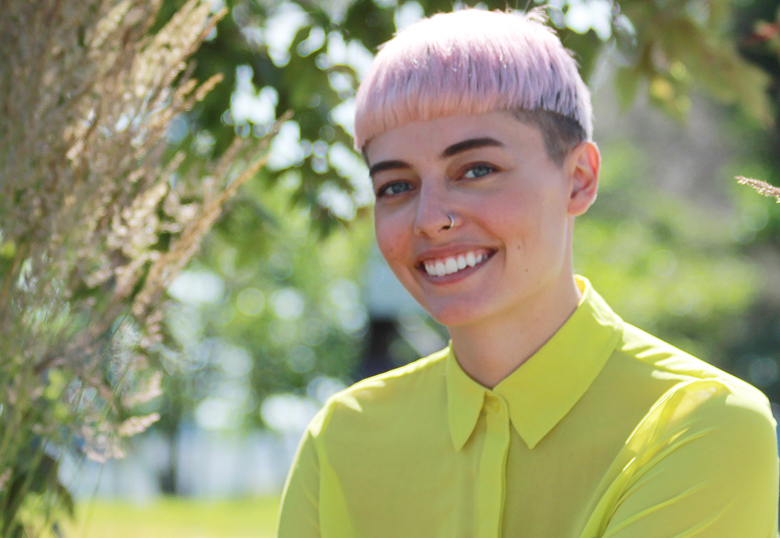Jaisie Walker, a University of Lethbridge graduate student in the Department of Women & Gender Studies, has been awarded the 2019 Parkland Institute Graduate Research Award for their project, Unsettling Lateral Violence: Queer Genealogies of Non/Monogamy in Southern Alberta.

Walker, born in England and raised in Scotland before moving to Canada following their high school years, has worked on the frontlines of anti-violence programming and seen how the queer and non/monogamous communities are underserved by current policies on interpersonal violence.
“What I continuously saw was that the literature these programs were relying on for their anti-violence programming still framed relationships in a heterosexual and monogamous lens and it continuously relies on this narrative of a victim-perpetrator model,” says Walker, who has worked for the U of L’s Campus Women’s Centre and the Safe Haven Women’s Shelter Society in Taber.
"For many LGBTQA2S+ people, non/monogamous relationships are seen as progressive and transgressive solutions to heteronormative violence. Consequently, non/monogamous relationships have become a way of mobilizing political values in an attempt to be more responsible, caring and loving. However, non/monogamies scholarship is beginning to outline significant constraints that factors such as race, gender and class have on negotiations of safety and desire in non/monogamous relationships. Furthermore, non/monogamous communities continue to express the need for community accountability and anti-violence models that move beyond punitive victim/perpetrator dichotomies."
Walker explains that, while the justice system still has its place in dealing with situations of interpersonal violence, most instances occur between people who have established loving, trusting relationships where criminal charges are not always a desirable outcome.
“When it comes to the queer community, for example, people don’t want to just rely on punitive justice frameworks,” says Walker. “When they are thinking about their relationships, they want to build sustainable new ways of doing things.
“Even in more progressive spaces, where a basic level of consent and agency is often emphasized, it can still be really difficult to identify, understand, communicate and navigate solutions around experiences of violence. This is especially fraught and complicated in LGBTQA2S+ contexts, where platonic and romantic community is relied on for survival, social and familial types of support, and the consequences of a punitive justice framework aren't sustainable. By using lateral violence as an anchor, a concept which acknowledges the peer-to-peer and structural components of violence, I’m hoping to create space for these community dynamics to be better addressed.”
Walker’s proposed study will utilize a participatory-action research approach. They look to gather 15 participants to photographically document community assets and concerns around violence, safety and accountability, critically discuss the resulting images, and communicate their desires for change with policymakers, educators and program developers through a participant-led public exhibit.
They gained approval from the Parkland Institute adjudicators for presenting a “well-prepared application with clear relevance to the communities of interest, and public policy applications.” The adjudicators also made note of the interdisciplinary nature of the project as it touches several fields of work while connecting to rural policy and governance issues.
“Verbalizing relationships can be really difficult, and interviews can be really difficult,” says Walker. “In PhotoVoice, participants are really leading what they produce. It’s exciting because this particular topic crosses over critical rural studies, feminist geographies, queer theory, anti-violence literature, gender studies, art—you can make this applicable in so many different kinds of fields.”
Dr. Trevor Harrison, U of L sociologist and director of the Parkland Institute, says Walker’s project is an excellent example of the breadth of research U of L students are involved in at the graduate level.
“Parkland supports research that pushes the boundaries of so-called common-sense understandings of the world, opening up instead avenues for greater dialogue,” he says. “Despite some legal gains in recent years, the LGBTQA2S+ community still faces many challenges, as Jaisie’s project highlights. Their submission was clear, well-articulated, and frankly exciting. We look forward to the results of their research.”
